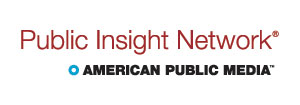Resource:
Public Insight Network

The Public Insight Network (PIN) is a powerful database of over 85,000 people who help to shape and deepen local and national public radio news coverage by volunteering their personal knowledge, experience, and opinions. Members of the network provide basic information about themselves and their areas of expertise, and receive periodic emails from their local newsroom soliciting their thoughts on issues that the station plans to cover. As Public Insight Network editor Andrew Haeg explains, reporter working on a series or piece on healthcare, could reach out into the network and find nurses and patients and doctors and administrators, sifting through responses to “see what themes and patterns emerge.”
The concept of Public Insight Journalism, with the PIN as its centerpiece, was originally pioneered by Minnesota Public Radio in response to what Haeg describes as “a big disconnect between what was going on in the newsroom — the decisions we were making, our editorial meetings — and what was going on out there in the community.” The PIN was designed to bridge that divide, pioneering what the Public Insight Journalism website describes as, “a new model of journalism to meet the needs of today’s open-source society…built on genuine partnership between news media and the public.”
This network-driven structure moves beyond what Haeg calls “Rolodex journalism” — relying on a small and trusted group of sources for news tips and suggestions for coverage. “We all know that people out there in the community have a much better feel for what’s actually going on on-the-ground,” he says, “and if you can include them in the conversation, you’re going to be much better off.”
This method of engaging the community in the process of newsgathering has steadily gained traction in public radio newsrooms since its launch in 2003, and has spread beyond Minnesota Public Radio and its parent organization, American Public Media, to local stations nationwide.” Source: Center for Social Media
The Journalism Accelerator is not responsible for the content we post here, as excerpts from the source, or links on those sites. The JA does not endorse these sites or their products outright but we sure are intrigued with what they’re up to.
Topics: Community Craft Experiments Resources








Weigh In: Remember to refresh often to see latest comments!
2 comments so far.
When I signed up to host a talk show on Oregon Public Broadcasting, exploring this new tool actually added to the appeal of the job. During my time there, PIN helped us find many great sources we may never have otherwise. We turned to it more for people with first hand experience than as an “experts” database. OPB used PIN extensively for its Peabody award-winning series on the recession http://news.opb.org/hardtimes/ It did take a full time person to manage the database because of the specific (and generally good) criteria PIN set up for the number of times network members are contacted and so forth. The biggest challenge was expanding the network to reach into communities not already in the station rolodex. Sometimes I felt like PIN enhanced a closed circle of listeners and news providers. A side note: I always thought it was funny that just hearing the name on the air you couldn’t tell whether it was to gain knowledge from the public or to get them riled up. Insight or incite?
RT @journaccel: A network of 120,000 (& counting), Public Insight Network expands the newsroom w/ diverse voices & citizen sources: http://t.co/HBwr1AN9